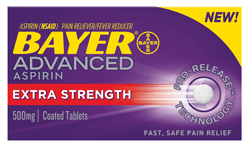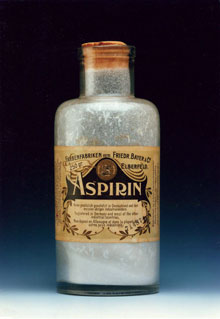Bayer Seeks To Reinvigorate Aspirin’s Pain Relief Profile
This article was originally published in The Tan Sheet
Executive Summary
Bayer HealthCare recently launched its “Fast Relief Challenge” campaign to remind consumers about aspirin’s pain relief indication and to highlight Bayer Advanced Aspirin. The firm refers to a survey showing 8% of respondents preferred aspirin more than other OTC pain relievers.
Aspirin’s popularity for helping reduce the risk of heart disease currently overshadows its pain relief benefits, according to Bayer AG, which introduced the nonprescription medication nearly a century ago.
“Bayer Aspirin has become predominantly known for its cardiovascular benefits rather than pain relief properties despite clinical evidence proving it to be an effective OTC analgesic,” says Reese Fitzpatrick, Bayer Consumer Care’smarketing director for the brand.
The Morristown, N.J.-based business of the German firm’s Bayer HealthCare LLC’s division recently launched its “Fast Relief Challenge” campaign to remind consumers about aspirin’s pain relief indication and to highlight Bayer Advanced Aspirin, a line extension available in regular strength (325 mg) and extra strength (500 mg) launched in May 2011 (Also see "Bayer Advances Aspirin Pain Relief With Pro-Release Technology" - Pink Sheet, 30 May, 2011.).

Bayer Advanced Aspirin Extra Stength
Photo courtesy of Bayer Consumer Care
Bayer Advanced Aspirin is formulated with Pro-Release “micro-particle technology” to produce a particle size on average 90% smaller than in earlier Bayer Aspirin tablets. Bayer HealthCare says the technology combines a smaller particle size with a rapidly disintegrating tablet to help Advanced Aspirin dissolve more quickly, and enter the bloodstream and deliver relief faster.
“Although aspirin has been available for more than 110 years, we believe U.S. consumers have forgotten about it as a pain reliever.”
-- Reese Fitzpatrick, Bayer HealthCare marketing exec
The firm adds that tests with consumers after dental surgery show Advanced Aspirin relieved pain twice as fast as previous Bayer Aspirin tablets.
However, research also shows few consumers associate aspirin with pain relief. In a 2008 online survey of 2,038 adults, only 8% report taking aspirin more often than other OTC pain relievers in the previous year, according to a Bayer Consumer Care April 17 release.
A more recent survey showed 95% of 497 consumers who used Bayer Advanced Aspirin Extra Strength said they would use the product again.
Pain Reliever To Life Saver
Bayer introduced the first aspirin product, a powder, in 1899 as a pain relief drug physicians could give patients and made the drug nonprescription in 1915, according to Bayer HealthCare’s “Wonder Drug” website. The firm also contributed to the rise in aspirin’s use for preventing heart disease.
Private Label Leads Analgesic Tablet Sales
Bayer Aspirin product sales slipped slightly over the past year, but the continued slump in Tylenol sales linked to McNeil Consumer Healthcare’s manufacturing quality-control problems dragged down the entire OTC analgesic tablet market nearly 3%. According Chicago-based market research firm SymphonyIRI’s data on sales from supermarkets, drugstores and mass merchandisers, excluding Walmart, Bayer Aspirin product sales were down 1.37% to $135 million for the 52-week period ending March 18.
Product Sales Change
52 Weeks Ending March 18
- Total market $2 billion -2.80%
- Private label $760.8 million 10.87%
- Bayer Aspirin $135 million -1.37%
- Advil $318.7 million 1.74%
- Aleve $206.7 million 5.98%
- Tylenol $118.1 million -36.39%
12 Weeks Ending March 18
- Total market: $460 million -9.49%
- Private label $188 million 15.96%
- Advil$74.3 million -0.75%
- Aleve$50.5 million 7.71%
- Bayer Aspirin $31.1 million -15.79%
- Tylenol$26.8 million -49.03%
Bayer HealthCare declined to disclose sales figures for its aspirin products, but said Bayer Aspirin is the leading low-dose aspirin brand in the U.S., with a market share of 51%, and the firm’s “pain portfolio has yielded double-digit growth since the launch of Bayer Advanced Aspirin.”
Aspirin’s use for preventing heart attacks traces to 1948 when a California general practitioner began recommending that "an aspirin a day" could reduce dramatically the risk of heart attack after he noticed that the 400 men to whom he prescribed aspirin had not suffered any heart attacks.

A vintage version of a Bayer Aspirin container
Photo courtesy of Bayer Consumer Care
In 1988, FDA proposed aspirin for reducing the risk of recurrent myocardial infarction and preventing first MI in patients with unstable angina. FDA also approved the use of aspirin for the prevention of recurrent transient-ischemic attacks or "mini-strokes" in men and made aspirin standard therapy for men who had suffered previous strokes. In addition to its role in heart attack and stroke prevention, researchers continue to explore aspirin's possible role in preventing colon and esophageal cancer and other diseases, according to Bayer HealthCare.
In 2003, Bayer filed a citizen petition asking FDA to broaden the professional labeling of aspirin to include an indication for prevention of a first heart attack in individuals at moderate or greater risk of coronary heart disease, reflecting American Heart Association and the U.S. Preventive Services Task Force recommendations for aspirin therapy to be considered for those at moderate risk for a cardiovascular event, as defined by a 6%-10% or greater risk over a 10-year period. The petition remains under review by FDA (Also see "Aspirin MI Primary Prevention Labeling Urged In Bayer Citizen Petition" - Pink Sheet, 17 Feb, 2003.).
Bayer also conducted an ad campaign in 2005 that sought to increase consumer awareness of low-dose aspirin for primary prevention of heart attacks, stating that Bayer can prevent one in three heart attacks (Also see "Bayer Low Dose Ads Urge Consumers To “Do More” In Cardiac Prevention" - Pink Sheet, 4 Jul, 2005.).
By 2007, aspirin had become the blood thinning agent of choice over three Rx antiplatelet medications for preventing first or repeat heart attack or stroke, Consumers Union reported (Also see "Aspirin Tops Three Rx Drugs In Preventing Heart Attack – Consumers Union" - Pink Sheet, 23 Apr, 2007.).
“Although aspirin has been available for more than 110 years, we believe U.S. consumers have forgotten about it as a pain reliever despite clinical evidence proving it to be an effective OTC analgesic,” Bayer HealthCare’s Fitzpatrick said in an email.
“With Bayer Advanced Aspirin, we hope to shift U.S. consumer perception when it comes to aspirin and pain relief,” Fitzpatrick added.
Bayer HealthCare points out aspirin remains predominantly a pain reliever in international markets. Consumer use outside the U.S. depends upon approved indications in each market and on how the product historically has been used there. Fitzpatrick said, for instance, Bayer Aspirin is used in Italy for colds and cold-related pain relief, but in Germany its primary use is for headache pain relief.
Consumers Rate Satisfaction, Help Red Cross
Bayer HealthCare launched the Fast Relief Challenge April 17, and through April 27 provided a free bottle of Bayer Advanced Aspirin to consumers who registered on the campaign’s website during a two-hour period each day.
The firm wants consumers to rate their satisfaction and to describe how fast Bayer Advanced Aspirin worked for them. While free bottles of the product are no longer available, the campaign continues to accept ratings and comments on Bayer Advanced Aspirin.
“We don’t want consumers to just take our word for it that Bayer Advanced Aspirin works for pain relief. We plan to share feedback received with the public on our website so everyone can hear about other consumers’ experiences with Bayer Advanced Aspirin,” Fitzpatrick said.
For every consumer rating received, Bayer said it will donate $1 to the American Red Cross, up to a total of $100,000, to provide food, shelter, emotional support, health services, clean-up supplies and comfort items to people affected by disasters each year.
Advanced Aspirin is not Bayer's first attempt at applying quick-dissolving technology to the brand. In 2009 the firm launched Quick Release Crystals (850 mg of aspirin and 65 mg of caffeine) in single-dose pouches, but the innovation failed to spur sales and was discontinued in September 2010.
